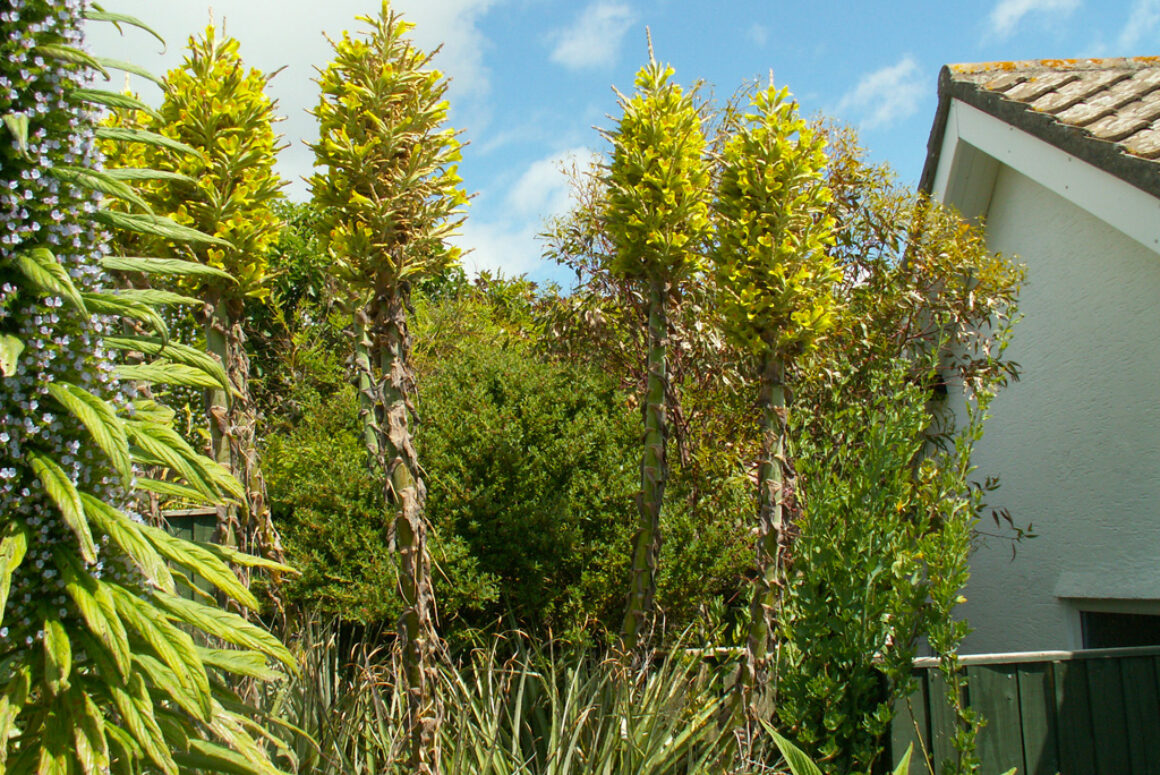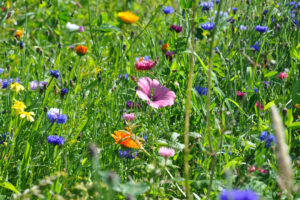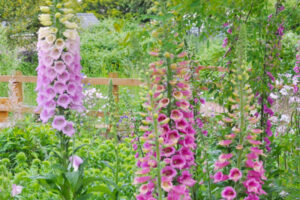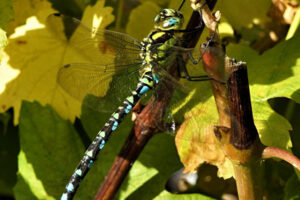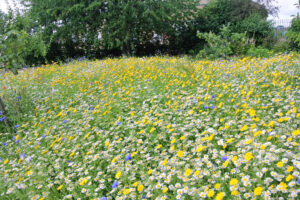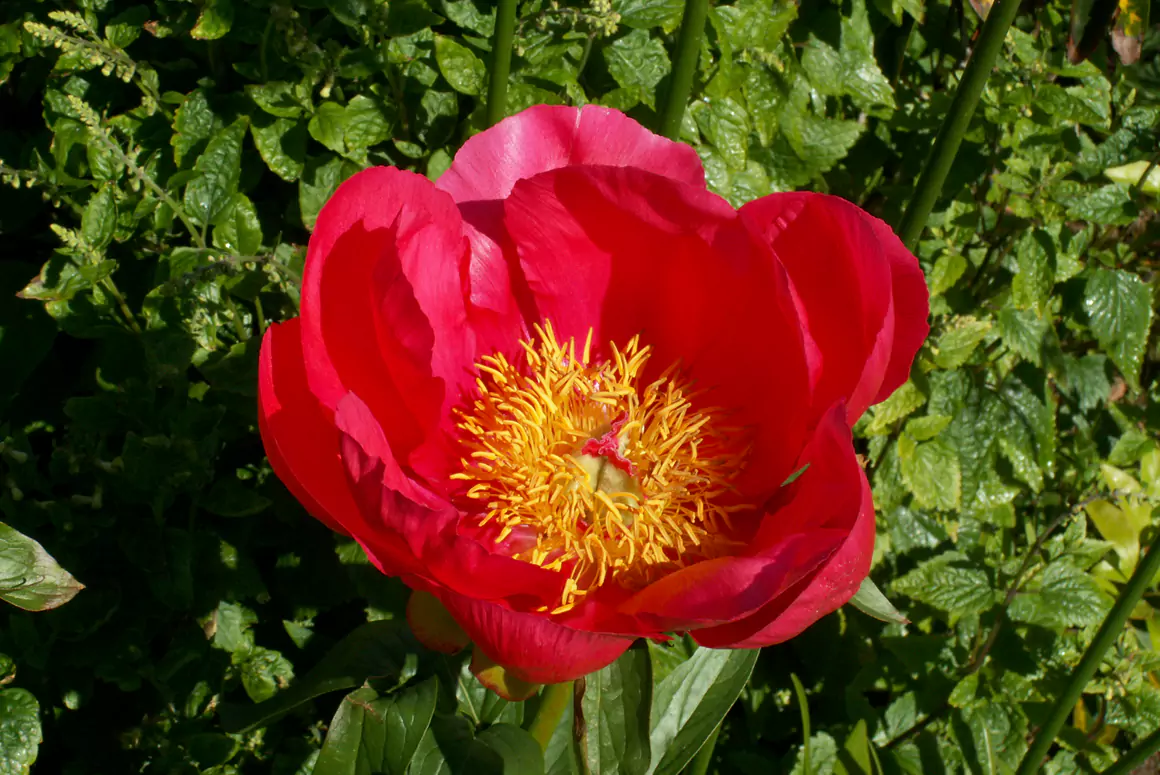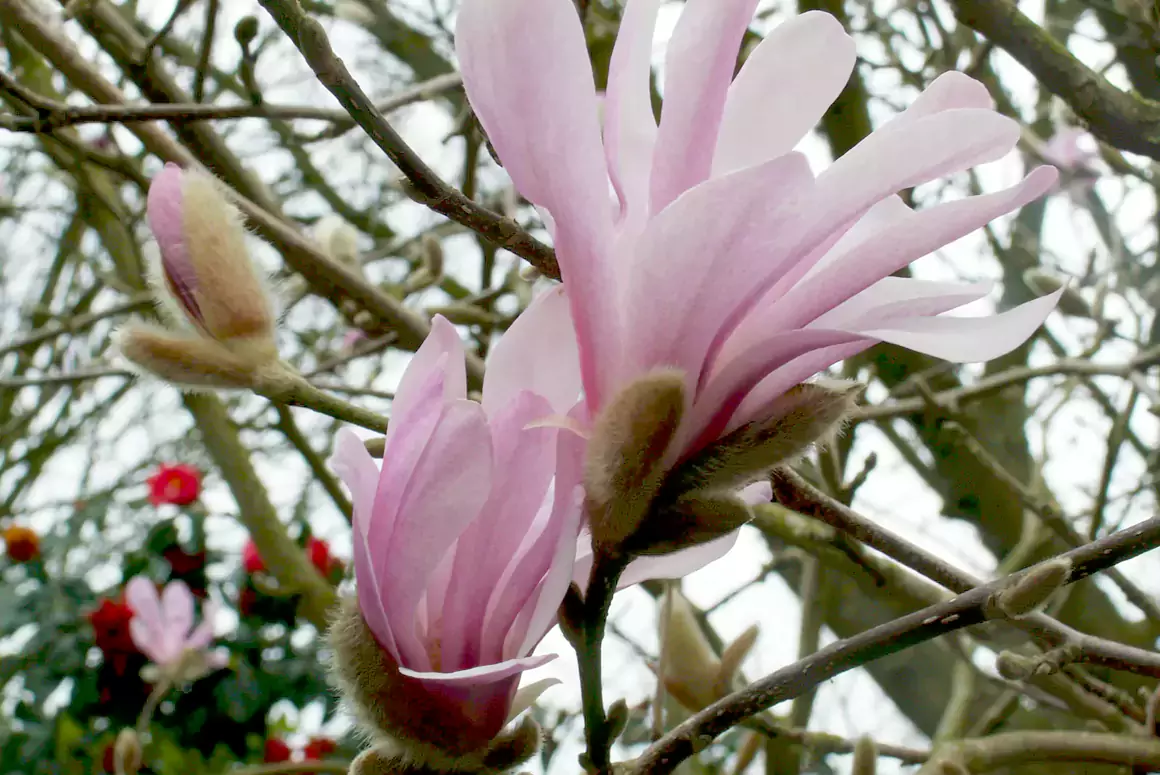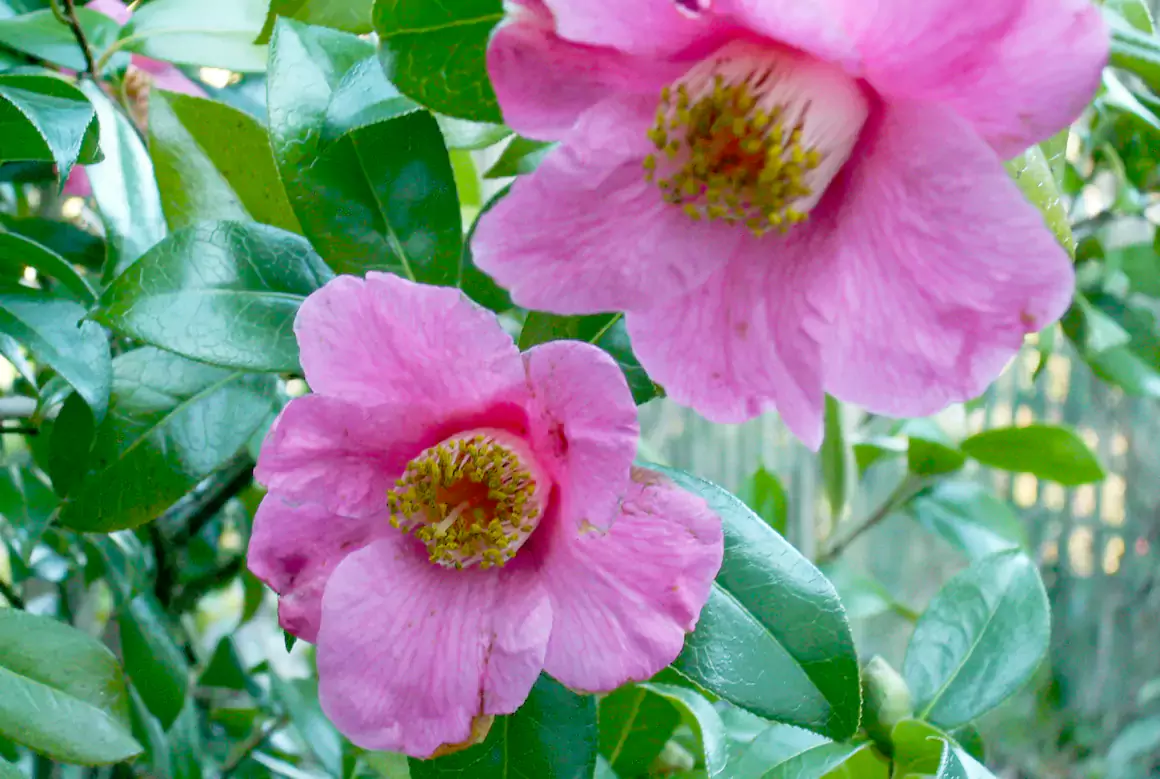![]()
We are living through extraordinary times as I write this article in June, a time that may go down in history as “The Lockdown”. It therefore seems appropriate, to describe some similarly extraordinary plants that I have grown in my mild maritime garden over the last 10 years. I have always enjoyed trying to cultivate plants which challenge my skills as a plantsman, take advantage of a propitious climate and now demonstrate the indisputable effects of global warming.
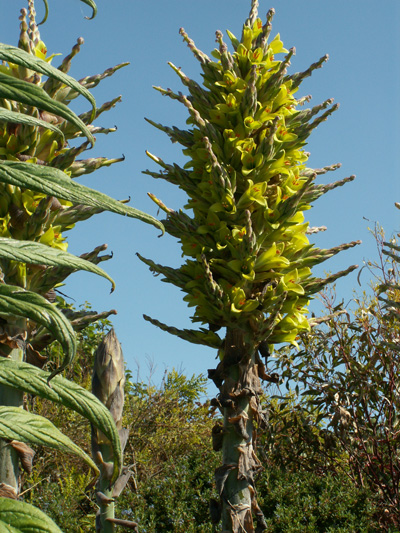
Puyas, which are related to the pineapple, have evolved in the foothills of mountains in Central and South America. The climate is typically dry, although frosts and snow are not uncommon. The stony and infertile soils lack nutrients and flowering can be delayed for many years. Typical Puyas grow at ground level as dense rosettes of leathery leaves fringed with spines of considerable ferocity, as I can testify. My own plant of Puya chilensis took 10 years from seed to produce its first flower. Now after a year’s rest, it has seven large metallic yellow flower spikes about 8 feet high, which have caused much local amazement. It is growing in very sandy, well-drained soil in an open position on a slope and needs full sun to succeed. There is a theory, that the ferocious inward facing spines evolved to entrap small birds and mammals whose subsequent death and decomposition provided the nutrition it lacked. Gauchos are said to believe that this entrapment extends to sheep. Consequently it is burned and dug up wherever found, becoming increasingly rare and endangered in the wild.
Digitalis is a genus of around twenty species, perhaps best known for our native Digitalis purpurea, otherwise foxglove. When Linnaeus categorised plants in 1753, he considered that Isoplexis sceptrum and Isoplexis canariensis were part of the Digitalis genus, however it was not until 1999 that they were definitely confirmed and renamed as Digitalis. I have grown both species but found Digitalis sceptrum, to be hardier and more impressive. Both originate from Madeira and flourished in well-drained soil in a partly sunny position. Digitalis sceptrum grew four feet tall and equally wide eventually producing fifteen flowers. Whilst in flower, it clearly shows its foxglove affinities, producing ten-inch-long spikes of eye-catching rusty orange flowers. I raised my plant from seed and it took five years to flower, otherwise it can be bought on line at several nurseries. Unfortunately my own plant succumbed to the “Beast from the East” in 2018 and –12 degrees, however I have a small plant in my greenhouse, which will be planted out next year.
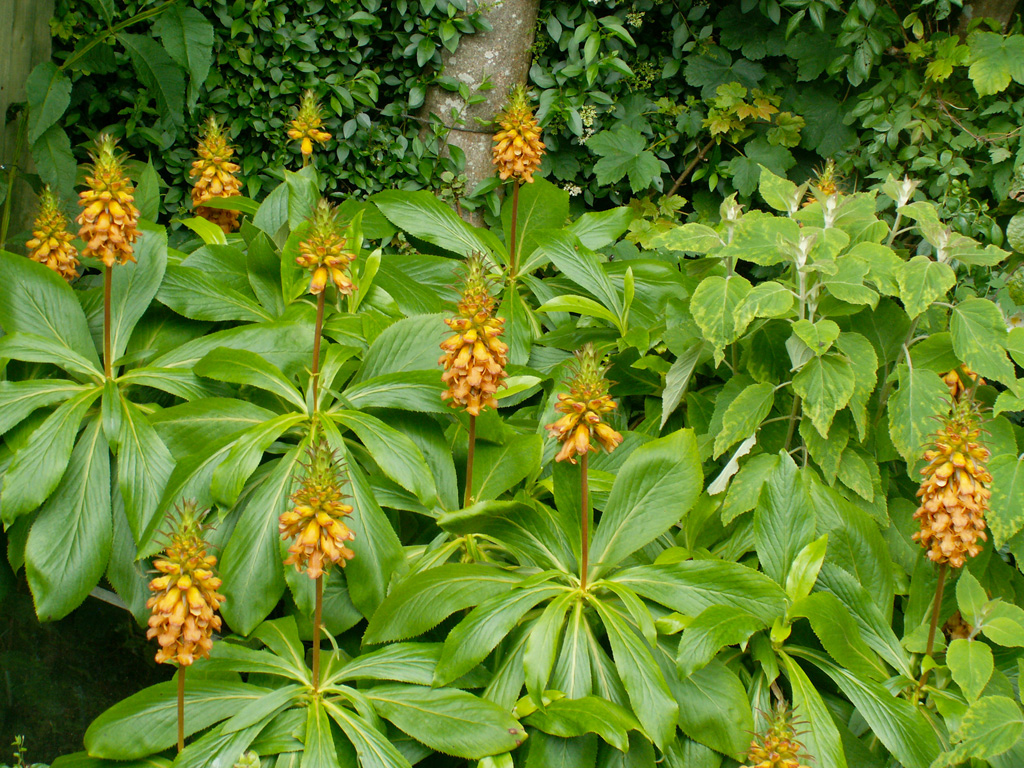
We were very sad to cancel our June garden opening but regret even more that a substantial sum will not be available to the National Garden Scheme charities. However, for those of you who are avid garden visitors like us, there is the opportunity to visit the Scheme’s website where you can access Virtual Garden Visits and view wonderful gardens from the security of your own home. Additionally some gardens in England (but not Wales) are now open on a strictly booked basis, accessed again via the website. There is also the opportunity to show your support for the many charities that benefit, by making an online donation. It is estimated that income will be reduced by 80% during 2020 at a time when core beneficiaries are stretched to the limit by the current crisis. It is hoped that some Welsh gardens may be able to open similarly later in the summer.
With such a large loss of funds, it is now more important than ever to increase the number of new gardens open for 2021. By opening your garden you are joining a community of thousands of other like-minded garden owners all passionate about great gardens and delighted to raise money for great causes. Opening Your Garden to the public may seem daunting at first, but many garden openers, including ourselves, find the experience hugely enjoyable and continue to open year after year. Your garden does not need to be large or elaborate and as a general guide, if you think it has quality, character and interest then please contact Susan Paynton, chairperson for Wales, who would love to speak to you. Nominations to open in 2021 are required by September 2020.
In addition to donations to nursing and health charities the N.G.S. grants Community Garden Awards. The scheme was set up to commemorate much loved journalist Elspeth Thompson, whose column often celebrated community gardens. Despite the Covid crisis, 44 awards have been made in 2020 including 5 to projects in Wales.
Close to Cardiff city centre is St. Peter’s Community Garden which was granted an award in 2017 to complete a new planting scheme. Started in 2008 with little more than a vision and some borrowed tools, volunteers turned a rubbish strewn site into an eco-friendly garden oasis for the local community. The partnership has continued with St Peter’s also opening for NGS charities since 2014.
St. Peter’s Community Garden
In these strange times subjected to “lockdown”, the garden has provided much solace and mine has received more care and attention than normal. However we are now eager to visit other gardens, plant shows and fairs and return to normal life!!!
Open Your Garden for the NGS
If you think you could join us Susan Paynton, chairperson for Wales would love to talk to you: Contact susan.paynton@ngs.org.uk or phone 01686 650531.
You can also find more information at: ngs.org.uk/get-involved/open-your-garden/
Donate to Support our Nurses
NGS Open Gardens
Welsh Country has two NGS open garden sections. The first ‘Open Gardens’ are gardens that are open on specific days and the ‘Long Term Open Gardens’ which are by appointment only. There is a search facility on each page so simply search for a garden name or an area of Wales (i.e. Swansea) you’d like to visit.
Feature image: Puya chilensis – The Boarlands, Port Eynon


